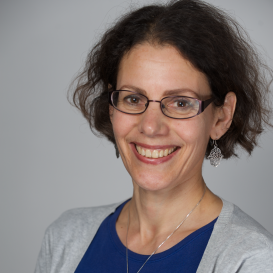Research Interests
- The history and culture of the Maghrib from the Islamic conquest to 1900
- Islamic political legitimacy
- Islamic urbanism
- The role of the Berbers in medieval Maghribi history


Amira K. Bennison became interested in the Middle East and North Africa while studying for her BA Hons in History and Arabic at Cambridge. After graduating, she went to live in Cairo for a year before studying for a Masters at Harvard University and a PhD at SOAS.
Her PhD, based on a year’s archival research in Morocco, looked at the impact of the French conquest of Algiers in 1830 on notions of political legitimacy in neighbouring Morocco and the importance of jihad in the western Maghrib. She went on to the University of Manchester as a Leverhulme Research Fellow before moving to the University of Cambridge in 1997 where she is now a Professor in the Department of Middle Eastern Studies.
Her work has continued to explore political legitimacy but has expanded to encompass Islamic Spain and the medieval Maghrib, and to consider urban planning, ceremonial and rhetoric alongside jihad. Professor Bennison has appeared in several TV programmes about the history of the Middle East and North Africa including ‘Europe’s Lost Civilisation’; ‘The Thirties in Colour’, ‘Islamic Science’; and 'The Ottomans'. She is also a regular contributor to Radio 4’s ‘In Our Time’ with Melvyn Bragg and other radio programmes and podcasts on Islamic history.
BA Hons in History and Arabic, University of Cambridge, 1989
AM in Middle Eastern History, Harvard University, 1992.
PhD in Moroccan History, University of London, 1996.
‘Traces of the Ancient: The pre-Islamic monuments of the Maghrib in the medieval Arabic geographical tradition’, in Javier Martínez Jiménez and Samuel Ottewill-Soulsby (eds), Remembering and Forgetting the Ancient City, Oxford: Oxbow, 2022, pp. 275-296.
‘Constantinople in the sixteenth-century Maghribī Imaginary: The Travelogue of ʿAlī al-Tamgrūtī’, in Elizabeth Key Fowden, Suna Çaǧaptay, Louise Blanke and Edward Zychowicz-Coghill (eds), Cities as Palimpsests? Responses to Antiquity in Eastern Mediterranean Urbanism, Oxford: Oxbow, 2022, pp. 372-386.
‘Relations between Rulers and Ruled in the Medieval Maghrib: The ‘Social Contract’ in the Almoravid and Almohad Centuries, 1050-1250’, Comparative Islamic Studies 10: 2 (2014): 137-156. (2017)
The Almoravid and Almohad Empires, Edinburgh: Edinburgh University Press (2016)
‘Drums, Banners and Baraka: Symbols of authority during the first century of Marīnid rule, 1250-1350’, in A. K. Bennison (ed.) The Articulation of Power in Medieval Iberia and the Maghrib, Oxford: Oxford University Press (2014), pp. 195-216.
‘Tribal identities and the formation of the Almohad élite: The salutory tale of Ibn ‘Aṭiyya’, in Mohamed Meouak (ed.), Biografías magrebíes. Identidades y grupos religiosos, sociales y políticos en el Magreb medieval, Madrid: Consejo Superior de Investigaciones Científicas (2012), pp. 245-72.
‘Muslim internationalism between empire and nation-state’, in Abigail Green and Vincent Viaene (eds), Religious Internationals in the Modern World, London: Palgrave (2012), pp. 163-85.
The Great Caliphs: the golden age of the ‘Abbasid empire, London: I. B. Tauris (2009) and New York: Yale University Press (2009). Runner-up in the Longman-History Today Book of the Year Award, 2009. Honorable mention in the British Kuwait Friendship Society Book Prize, 2010.
Religious Minorities under the Almohads, special issue of the Journal of Medieval Iberian Studies 2: 2 (2010) edited with María Angeles Gallego.
‘The necklace of al-Shifa’: ‘Abbasid borrowings in the Islamic West’, Oriens 38 (2010) 251-276.
Cities in the Premodern Islamic World: the Urban Impact of Religion, State and Society, London: RoutledgeCurzon (2007) edited with Alison L. Gascoigne.
Jihad and its Interpretations in Pre-Colonial Morocco. London: Curzon (2002).